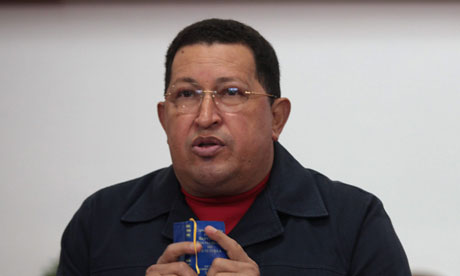Venezuelan president’s unexpected trip to Cuba for follow-up cancer treatment prompts fears of rapid decline in health
- guardian.co.uk, Thursday 6 December 2012 07.33 EST

Hugo Chávez is expected to miss an important regional summit in Brazil on Friday, raising fears that the Venezuelan president’s health may have taken a turn for the worse.
Chávez was absent from Thursday’s preparatory meeting for the Mercosur summit, and a spokesman for the Venezuelan ministry of foreign affairs refused to say whether he would attend on Friday.
“I have no information on the matter. President Chávez could very well surprise us there, or we could be receiving a statement in the next minutes,” a spokesman, Victor Castellanos, told the Guardian.
Fears about Chávez’s health have resurfaced since his trip to Cuba last week for follow-up treatment after undergoing chemotherapy and surgery this year.
In a letter to the national assembly, which had to approve the trip, he said the treatment would include hyperbaric oxygenation – which involves breathing pure oxygen inside a sealed chamber – to repair bone and tissue damaged during radiotherapy.
Chávez, who was diagnosed with an unspecified type of cancer 18 months ago, has not been seen in public since 15 November, when he held a meeting with ministers.
A spokesperson for the Brazilian foreign affairs ministry had previously confirmed his attendance this Friday at the regional Mercosur summit in the Brazilian capital. But there is speculation that the recently re-elected president may be facing graver health problems than the government is willing to admit.
“I am under the impression that Chávez’s health has suffered a rapid decline. The effort he put into the re-election campaign has had an impact on his illness. He had to leave practically in an emergency and without the formalities and public acts that usually accompany his departure,” said Teodoro Petkoff, editor of the Venezuelan newspaper Tal Cual.
Most of Chávez’s cancer treatment has been carried out in Cuba in secrecy. The few brief health reports have been made almost entirely by the president. He has been careful not to disclose the type of cancer he has, describing it simply as a “tumour the size of a baseball” that was removed from his pelvic region.
Since first being diagnosed with cancer following emergency surgery while on a trip to Cuba on June 2011, Chávez has flown to Havana for two additional operations and numerous sessions of chemotherapy.
Unlike previous trips to Cuba, when Chávez continued to carry out presidential duties such as televised conferences with his ministers in Havana or tweeting updates on his health, the 58-year-old leader has been uncharacteristically silent.
Since his sudden departure on 29 November, the only messages from Chávez, who declared himself to be cancer-free in July, have been via his minister of information, Ernesto Villegas, who tweeted this week that the president had named a new group of ambassadors and had approved additional aid for victims of the 2010 landslides using an electronic signature. Chávez’s own Twitter account has been inactive since 1 November.
This latest trip comes two weeks before regional polls. The elections could give the president’s party control of most of the 23 governorships, which, as Chávez has said, would consolidate “his perfect victory”. But his absence may be felt at the polls as strong support for the president does not always trickle down to others in his party.
Villegas said Chávez would be back by 10 January, when he is scheduled to be sworn in for a fourth term. “We have Chávez for a while longer,” he said.
In the meantime, Venezuelans can do nothing but wait for news of their president’s health.
“The whole country is in this expectant mode. It’s as if we were waiting for Godot,” Petkoff said.